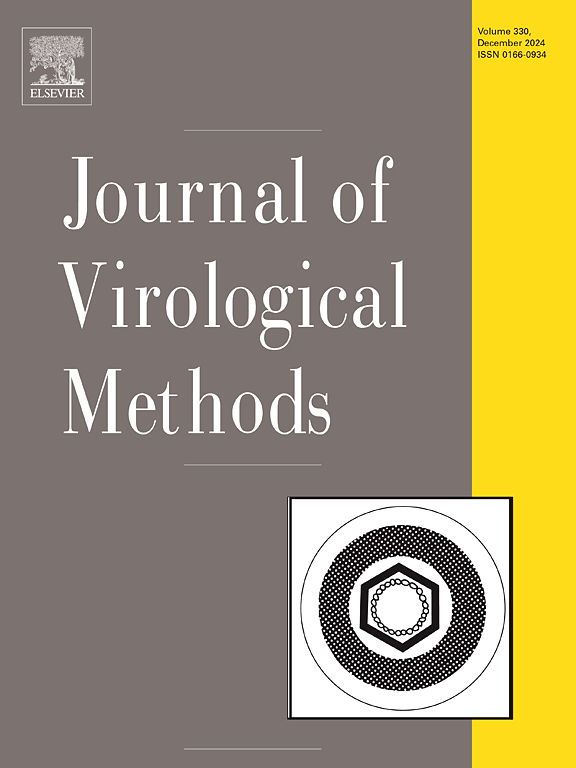建立检测非洲猪瘟病毒抗体的免疫过氧化物酶单层法
IF 1.6
4区 医学
Q3 BIOCHEMICAL RESEARCH METHODS
引用次数: 0
摘要
非洲猪瘟(ASF)是一种影响家猪和野猪的致命传染病,由非洲猪瘟病毒(ASFV)引起,死亡率高达100% %。非洲猪瘟病毒不断演变的流行和变异导致了低毒力毒株的出现,这些毒株诱发了慢性感染,并由于潜在的假阴性给基于核酸的诊断带来了挑战。这强调了迫切需要可靠的抗体监测以促进早期诊断。本研究以高度减毒的BK2258细胞适应株HLJ18/BK33为基础,建立了一种检测ASFV抗体的免疫过氧化物酶单层法(IPMA)。经608份猪血清优化后,该检测方法的灵敏度和特异性均优于市售的iELISA。新建立的IPMA方法对其他6种重要的猪病原体具有高特异性,与阳性血清无交叉反应性。本研究建立的IPMA方法具有较高的灵敏度和特异性,可作为其他ASFV抗体检测方法的血清学诊断和评价的金标准。IPMA方法将为中国非洲猪瘟监测和防控提供一种新的有效策略。本文章由计算机程序翻译,如有差异,请以英文原文为准。
Establishment of an immunoperoxidase monolayer assay for the detection of African swine fever virus antibodies
African swine fever (ASF) is a lethal infectious disease affecting domestic and wild pigs, caused by the African swine fever virus (ASFV), with a mortality rate of up to 100 %. The evolving prevalence and variation of ASFV has led to the emergence of low-virulence strains, which induced chronic infections and posed challenges in nucleic acid-based diagnostics due to potential false negatives. This underscores the urgent need for reliable antibody monitoring to facilitate early diagnosis. In this study, based on a highly attenuated BK2258 cell-adapted strain HLJ18/BK33, we established an immunoperoxidase monolayer assay (IPMA) for ASFV antibodies detection. After optimization using a total of 608 pig sera, the performance of the assay was better than that of the commercial iELISA with higher sensitivity and specificity. The newly established IPMA method demonstrated high specificity with no cross-reactivity with positive sera for six other important porcine pathogens. The IPMA method developed in the present study could serve as the potential gold standard for serological diagnosis and evaluation of other detection methods for ASFV antibodies, owing to its high sensitivity and specificity. Furthermore, the IPMA method will provide a new and effective strategy for ASF monitoring, prevention and control in China.
求助全文
通过发布文献求助,成功后即可免费获取论文全文。
去求助
来源期刊
CiteScore
5.80
自引率
0.00%
发文量
209
审稿时长
41 days
期刊介绍:
The Journal of Virological Methods focuses on original, high quality research papers that describe novel and comprehensively tested methods which enhance human, animal, plant, bacterial or environmental virology and prions research and discovery.
The methods may include, but not limited to, the study of:
Viral components and morphology-
Virus isolation, propagation and development of viral vectors-
Viral pathogenesis, oncogenesis, vaccines and antivirals-
Virus replication, host-pathogen interactions and responses-
Virus transmission, prevention, control and treatment-
Viral metagenomics and virome-
Virus ecology, adaption and evolution-
Applied virology such as nanotechnology-
Viral diagnosis with novelty and comprehensive evaluation.
We seek articles, systematic reviews, meta-analyses and laboratory protocols that include comprehensive technical details with statistical confirmations that provide validations against current best practice, international standards or quality assurance programs and which advance knowledge in virology leading to improved medical, veterinary or agricultural practices and management.

 求助内容:
求助内容: 应助结果提醒方式:
应助结果提醒方式:


